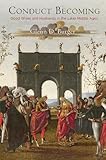Conduct Becoming : Good Wives and Husbands in the Later Middle Ages / Glenn D. Burger.
Material type: TextSeries: The Middle Ages SeriesPublisher: Philadelphia : University of Pennsylvania Press, [2017]Copyright date: ©2018Description: 1 online resource (272 p.) : 4 illusContent type:
TextSeries: The Middle Ages SeriesPublisher: Philadelphia : University of Pennsylvania Press, [2017]Copyright date: ©2018Description: 1 online resource (272 p.) : 4 illusContent type: - 9780812294484
- Conduct of life in literature -- History -- To 1500
- Literature, Medieval -- History and criticism
- Marriage in literature -- History -- To 1500
- Sex role -- Europe -- Religious aspects -- Christianity -- History -- To 1500
- Sex role -- Europe -- Religious aspects -- Christianity -- History
- Virtue in literature -- History -- To 1500
- Wives in literature -- History -- To 1500
- Wives -- Religious life -- Europe -- History -- To 1500
- Wives -- Europe -- Conduct of life -- History -- To 1500
- Women -- Books and reading -- Europe -- History -- To 1500
- LITERARY CRITICISM / Medieval
- Cultural Studies
- Gender Studies
- Literature
- Medieval and Renaissance Studies
- Women's Studies
- 306.87230940902 23
- HQ1147.E85 .B874 2018
- online - DeGruyter
| Item type | Current library | Call number | URL | Status | Notes | Barcode | |
|---|---|---|---|---|---|---|---|
 eBook
eBook
|
Biblioteca "Angelicum" Pont. Univ. S.Tommaso d'Aquino Nuvola online | online - DeGruyter (Browse shelf(Opens below)) | Online access | Not for loan (Accesso limitato) | Accesso per gli utenti autorizzati / Access for authorized users | (dgr)9780812294484 |
Frontmatter -- Contents -- Introduction. Loving, Reading, Acting in a Marrying Kind of Way -- Chapter 1. Laboring to Make the Good Wife Good in the Journées Chrétiennes -- Chapter 2. Remaking the Feminine -- Chapter 3. In the Merchant’s Bedchamber: Le Menagier de Paris -- Chapter 4. Affecting Conduct: Feeling Steadfast with Griselda -- Conclusion -- Notes -- Works Cited -- Index -- Index
restricted access online access with authorization star
http://purl.org/coar/access_right/c_16ec
Conduct Becoming examines a new genre of late medieval writing that focuses on a wife's virtuous conduct and ability of such conduct to alter marital and social relations in the world. Considering a range of texts written for women—the journées chrétiennes or daily guides for Christian living, secular counsel from husbands and fathers such as Le Livre du Chevalier de La Tour Landry and Le Menagier de Paris, and literary narratives such as the Griselda story—Glenn D. Burger argues that, over the course of the long fourteenth century, the "invention" of the good wife in discourses of sacramental marriage, private devotion, and personal conduct reconfigured how female embodiment was understood.While the period inherits a strongly antifeminist tradition that views the female body as naturally wayward and sensual, late medieval conduct texts for women outline models of feminine virtue that show the good wife as an identity with positive influence in the world. Because these manuals imagine how to be a good wife as necessarily entangled with how to be a good husband, they also move their readers to consider such gendered and sexed identities in relational terms and to embrace a model of self-restraint significantly different from that of clerical celibacy. Conduct literature addressed to the good wife thus reshapes how late medieval audiences thought about the process of becoming a good person more generally. Burger contends that these texts develop and promulgate a view of sex and gender radically different from previous clerical or aristocratic models—one capable of providing the foundations for the modern forms of heterosexuality that begin to emerge more clearly in the fifteenth and sixteenth centuries.
Mode of access: Internet via World Wide Web.
In English.
Description based on online resource; title from PDF title page (publisher's Web site, viewed 24. Aug 2021)


